- Home
- H A CULLEY
The Strategos
The Strategos Read online
THE STRATAGOS
Book One of the Macedon Trilogy
By
H A Culley
Published by Orchard House Publishing
First Kindle Edition 2015
Text copyright © 2015 H A Culley
The author asserts the moral right under the Copyright, Designs and Patents Act 1988 to be identified as the author of this work.
All Rights Reserved. This book may not be reproduced in any form, in whole or in part, without written permission from the author.
Cover Image : © 123rf.com (Michael Heywood)
Table of Contents
Author’s Note
NOTE ON THE ARMIES OF ANCIENT GREECE
Glossary OF GREEK TERMS
Chapter One – Early Days
Chapter Two – Mercenary
Chapter Three – Border Conflict
Chapter Four – The Road to Eygpt
Chapter Five – The Cuckold King
Chapter Six – Regicide
Chapter Seven – Hostage in Thebes
Chapter Eight – Towards a Professional Army
Chapter Nine – The Death of Perdiccas
Chapter Ten – The Regent and the Boy King
Chapter Eleven – The Battle of Erigon Valley
Chapter Twelve – Audata and Cleitus
Chapter Thirteen – The Siege of Amphipolis
Chapter Fourteen – The Serpent Queen
Author’s Note
This is the first of a trilogy of novels charting the development of Macedon from a fractured kingdom, barely able to hold itself together, to become the dominant state in Greece. Never before had one man managed to dominate the fiercely independent Hellenistic city states and kingdoms and unite them in one cause: war with Persia.
Much has been written about Alexander the Great and his conquests, not only of the Persian Empire, but of countries beyond such as Bactria (modern Afghanistan), Syria, Egypt and Northern India. Much less has been is generally known about the man who made Alexander’s conquests possible – his father, King Philip II.
He achieved this, first securing his own land from invasion and creating an army second to none in the world at that time, and then moving on to subdue the rest of Greece through conquest, threat, diplomacy and subterfuge. Throughout this time Parmenion – the Strategos of the title - stood at Philip’s right hand and was instrumental in many of his military victories. This first novel takes Parmenion as the central character and, through him, tells the first part of the story – the foundation of a powerful Macedon out of the mess that Philip inherited.
I have taken a few liberties with chronology in order to tell a story. For example, the capital of Macedon in the days of Amyntas II was Aegae (later Edessa). It didn’t move to Pella until Philip II was on the throne. The first mention of horse archers wasn’t until 329 BC when Alexander recruited a thousand of them in Persia. However it is not inconceivable that they existed in the Macedonian army before this date. Certainly there were Scythian horse archers well before this date.
Little is known of Parmenion before he became one of Philip’s, and then Alexander’s, most successful generals. Working back from his execution in 330 BC, when he was about seventy years old, he must have been born around 400 BC but the place of his birth and details of his early life aren’t recorded. He may well have been born a Macedonian, there are no sources to confirm or deny this, though some others have portrayed him as being born in Sparta or elsewhere in Greece. However, he must have been a young officer aged eighteen or nineteen by the time of Philip’s birth and I have therefore assumed that he was the son of a minor nobleman. It would have been unlikely that someone not of noble birth could have risen to be Philip’s senior army commander. Using Amphipolis as his birthplace is pure invention, however.
This first part of the trilogy covers Parmenion’s early life up to 356 BC, by which time Philip had put down all internal opposition to his rule and established secure borders against the Illyrians, Thracians and Paionians. 356 BC was also the year of Alexander’s birth.
The second book – the Sacred War – starts in the same year and tells of the struggle against Athens and the subjugation of the rest of the Greek mainland, which took until 338 BC, just two years before Philip’s assassination.
The third book will be based around Philip’s assassination, the aftermath and Alexander’s struggle to secure the throne for himself.
By the end of the trilogy he is ready to embark on his journey of conquest and he leaves Macedon, never to return to his homeland. Much has been written about Alexander the King, both as fiction and non-fiction, and so I wanted to concentrate on the path which led to his conquests, partly because far fewer authors seem to have tackled this period.
I hope you enjoy this first book in the series.
Please leave a review on Amazon as constructive criticism is always helpful to any author.
NOTE ON THE ARMIES OF ANCIENT GREECE
There were three basic types of military service in Ancient Greece:
a. Professional soldiers . Mainly mercenaries until the time of Philip II of Macedon, except for Sparta, whose whole society was organised on military lines. Apart from the Spartans, Philip was the first to introduce a full time professional element, other than hired mercenaries, as part of the army of a kingdom or a city state.
b. Small specialist full time units . Most cities had a city watch, which was a mixture of a police force and the nucleus of the city’s defence force. Other examples included the Companions of the kings of Macedon. Until Philip’s time these were a cavalry bodyguard made up of the sons of nobles and other important men. Philip, and later his son Alexander, expanded their numbers to form an elite cavalry force and added the foot Companions, an elite formation of hoplites.
c. The citizen militia . The great majority of nearly all Greek armies were made up of part-time soldiers who trained regularly but who had other occupations. They were called up, sometimes for long periods, when danger threatened.
The nomenclature of various sizes of units and their commanders varied from place to place and through time. To save confusion I have adopted the most common terminology and applied it, irrespective of the state or kingdom to which the unit belonged.
Ranks and Appointments
Senior Officers
Hegemon – Supreme leader in a political as well as a military sense, usually of a federation or an alliance.
Polemarch – Overall Commander, in the case of Macedon this was normally the king.
Strategos – General, the commander of an army under the Polemarch.
Taxiarch – Deputy commander of an army commanded by a strategos or commander of a major element of the army.
Phrourarch – Garrison commander.
Cavalry
Epihipparchos – Commander of a thousand men, termed an epihipparchia.
Hipparchos – Commander of five hundred men, termed a hipparchia.
Lochargos – Commander of two hundred and fifty men, termed a lochus.
Tetrachos – Ilium (troop) commander. Ilia varied in size but fifty men on average seems logical.
Infantry
Chiliarch – Commander of a thousand men, termed a chiliarchy.
Pentakosiarch – Commander of five hundred men, termed a tagma.
Lochargos – Commander of two hundred and fifty men, termed a lochus.
Phylearch – Leader of a file, which varied in size from eight to sixteen men,
Little is known about those who provided the service elements of the armies, such as the medical corps and engineers. It seems possible that physicians, surgeons and engineers were all civilians who were drafted in as required. Those who assisted them were probably normal soldiers who were detailed to help as needed
.
Glossary OF GREEK TERMS
BASILEUS – Honorific used when addressing a king or emperor.
BASILISSA – Honorific used when addressing a queen.
BOEOTARCH – The term used in Boeotia for a strategos who also held political as well as military power. In many ways they were similar to the consuls during the days of the Roman Republic.
CHLAMYS – A short cloak made of fine wool worn by men, especially for riding.
CHITON – A sleeved tunic worn by both men and women, usually with a belt. For women and certain men, such as priests and the elderly, the chiton was ankle length, but a knee length version was worn by the majority of men.
EPHEBE – A youth undergoing military training.
EXOMIS – A simple sleeveless tunic work by workers and soldiers.
GASTRAPHETETES – A large hand-held crossbow which fired an iron bolt.
HETAERA – Prostitute.
HIMATION – A type of cloak worn over a chiton. It was essentially a rectangular cloth draped over the left shoulder and about the body.
KYRIA – Honorific used when addressing a noblewoman or a lady senior is status.
LINOTHRAX – Body armour made of linen glued in layers with animal fat, often quilted and reinforced with metal in key areas.
LITHOBOLOS – An artillery weapon capable of throwing a stone of between 10 lb to 180 lb in weight, depending on the size of machine. Unlike later counterweighted catapults like the onagar or the trebuchet, these were torsion powered with the stone being propelled along a wooden channel by a large bow. This limited their range to between a hundred two hundred yards.
PELTAST – A soldier armed with a throwing weapon such as a javelin. The term also included archers and slingers.
PAEAN - A fervent expression of joy or praise, usually in song.
SKEUPHORUS – A personal slave to a military officer.
Chapter One – Early Days
386 to 382 BC
It would have been alright if Kionos hadn’t collapsed near the lioness’ den. The morning had started well. Parmenion was flushed with exertion and struggling to breathe as he raced up the steep path to the top of Mount Pangaion, the six thousand foot high mountain near Amphipolis. Behind him his three friends laboured to keep up. All four had long since got their second wind and they tried to ignore the pain in their calves as their sandaled feet pounded up the stony track. They all wore a short chiton, called an exomis, made of linen which were soaked in sweat that made the cloth cling to their bodies.
They were about to be enlisted into the military academy as ephebes - the name given to boys between fourteen and eighteen who were undergoing military training. At the academy they would train to become officers in the city’s army. All sons of citizens became ephebes at fourteen but only six or seven per cent were invited to join the academy. This test was the first of many designed to prove that they were worthy of the honour; noble birth not being sufficient, though that too was a prerequisite.
Amphipolis was self-governing and lay to the north east of Macedon, close to the border with Thrace. The city had been a dependency of Athens at one time and both Macedon and Sparta had tried to seize it in the past. The civil wars between various claimants to the throne of Macedon had diverted unwelcome attention away from it for several years but, after Amyntas had emerged as the victor and established himself on the Macedonian throne, he had started the long process of making Macedon powerful again and Amphipolis now felt itself under threat once more.
At the time when Parmenion and his friends ran up the mountain, Sparta had just concluded a peace treaty with Athens and were about to ally themselves with Macedon in an attempt to re-establish their influence in the north. From being a bit player on the periphery of the Hellenic world, Macedon was about to move centre stage, but none of that bothered the four boys. They were just excited at the prospect of officially graduating from children to ephebes.
Parmenion reached the top just ahead of the next boy, Orestes, and he collapsed on the ground feeling as if his chest was on fire.
‘It’s no good if you arrive first but are unable to fight, Parmenion,’ the boy managed to gasp as he stood looking down at his friend whilst clutching his sides as he dragged in great lungfuls of air.
‘The object wasn’t to fight but to win the race, Orestes,’ his friend replied after a while when his breathing was less laboured. ‘If we needed to fight we would have all arrived together.’
The other two reached the top, one after the other, and the four all sat, not speaking for some time as they looked down at the plain, the city and the sea beyond. They had started the run at dawn to take advantage of the cool temperature at the start of the day, but now the sun was getting hot. However, none of them felt inclined to start the long descent and the run home along the road that ran through estates of olives and vines back to Amphipolis.
‘Do you think there’ll be another war?’ One of them asked, worried that, with the treaty recently concluded which had brought peace throughout the Hellenic world, his chance for glory had passed.
‘We’ll be ephebes for the next four years. Who knows what’ll happen in that time,’ Parmenion replied. ‘Peace never seems to last for long.’
He was a tall, somewhat gangling, boy with black hair and an olive complexion. He couldn’t be called handsome but his face conveyed determination and the seriousness with which he regarded life. By comment consent he was the leader of the little group and had been since they were small.
Whilst the others lived for the day and had little curiosity about politics, except when an event affected them personally, Parmenion took a keen interest in what was happening in the wider world and in military strategy.
His closest friend was Orestes. He listened to what Parmenion told him about the threats that Amphipolis faced, mainly from Athens and Macedon, but he didn’t really understand why things couldn’t continue as they were. He knew that his city had once been a colony of Athens but that had been a long time ago and Athens had been engaged in a power struggle with Sparta since before he had been born. That was over for the moment and, although the lands ruled over by Macedon had never included Amphipolis, its more powerful neighbor had always coveted the gold and silver mines in the area surrounding the mountain on which the four boys now sat.
Parmenion was looking forward to being a soldier, although he preferred strategy and the theory of war to actual fighting. He admired the Macedonian king, Amyntas, as a warrior and as a strategos but he didn’t want his city to be ruled by him. On the other hand, he didn’t want it to be ruled by Athens either, or even worse, by Sparta.
His reverie was interrupted as Orestes got to his feet and the other two followed suit.
‘Come on, race you down,’ Kionos, the youngest and smallest of the four friends, yelled and got a head start on the others before they realised that he had challenged them. They chased after him but soon gave up. Parmenion had enough sense to realise that the race up the mountain had exhausted them and it was now hot enough for there to be a risk of dehydration and heat stroke as they had no water with them. Therefore he wasn’t altogether surprised when they came across Kionos lying beside the path towards the bottom. The boy was unconscious and looking very red and flushed.
‘Bloody idiot,’ Orestes muttered.
‘Let’s carry him into the shade of that bush. Then we need water.’ Parmenion as usual knew what to do and had taken the lead.
‘There’s a house over there,’ the fourth boy, Demetrius, said, pointing. ‘I’ll go and ask for a water skin.’
‘I’ll come with you,’ Parmenion told him as he and Orestes lay the unconscious Kionos down in the shade. ‘We’ll need lots of water to cool him down.’
However, just as he was about to chase after Demetrius, he heard a roar and a lioness appeared around the rocks no more than thirty feet away. Behind her two small cubs tottered on unsteady legs. Parmenion turned back and picked up a broken branch from an olive tree that lay o
n the ground. It wasn’t much of a weapon but it was better than nothing.
‘Don’t be an idiot. You don’t stand a chance, Parmenion. Get out of here.’ Orestes had crouched over the unconscious Kionos protectively, but he had no weapon of any kind.
‘Don’t move,’ Parmenion called to his friend. ‘If she doesn’t feel threatened she might ignore us.’
He had heard that there was a lioness in the area who had been seen killing goats for meat. So far she had eluded the hunting parties that had sought her. She had evidently been excluded from the pride that lived further into the mountains for some reason and had now given birth to two cubs. She wasn’t a man-eater as far as he knew, but the cubs made her more dangerous than normal.
Parmenion found that standing still so close to the ferocious beast was nerve-wracking. He was itching to either run away or attack it, the former being his preferred option. The tension was getting to him and he felt urine trickling down his bare legs. Then, as suddenly as she had appeared, the lioness disappeared, her gamboling cubs following her.
Ten minutes later Demetrius returned to find Parmenion and Orestes sobbing in relief and gabbling about their lucky escape. At first he didn’t believe them but Orestes showed him the prints of the beast in the dust and his face paled.
‘Zeus preserve us. Let’s get out of here in case she comes back.’
They quickly bathed Kionos, and then carried him down the track until he got too heavy to take further. They put him down again and kept wetting him until the evaporating water had got his body temperature back down. Once he was conscious, they fed him small quantities of water until he puked. After that he managed to keep it down and slowly he recovered.

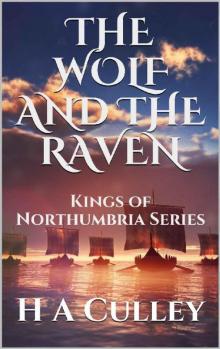 The Wolf and the Raven
The Wolf and the Raven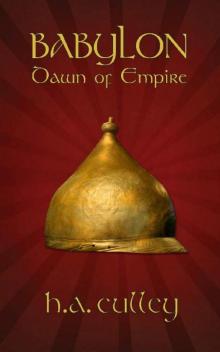 Dawn of Empire
Dawn of Empire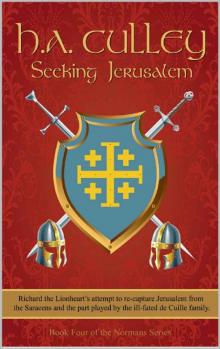 Seeking Jerusalem
Seeking Jerusalem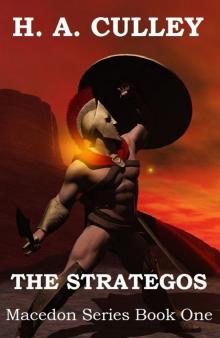 The Strategos
The Strategos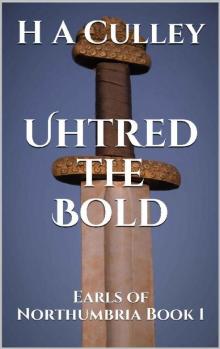 Uhtred the Bold
Uhtred the Bold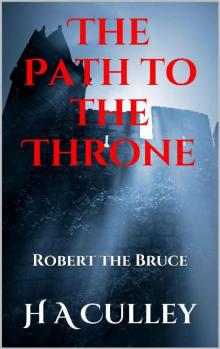 The Path to the Throne
The Path to the Throne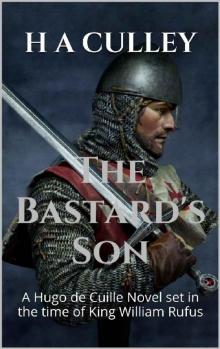 The Bastard's Son
The Bastard's Son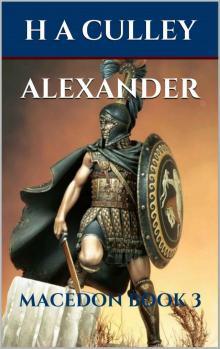 Alexander
Alexander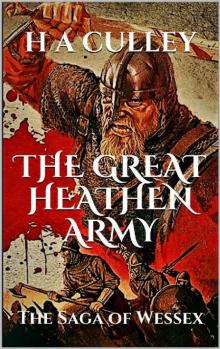 The Great Heathen Army
The Great Heathen Army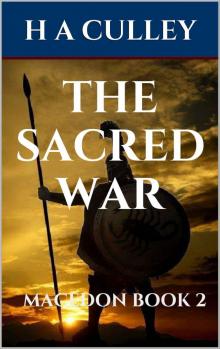 The Sacred War
The Sacred War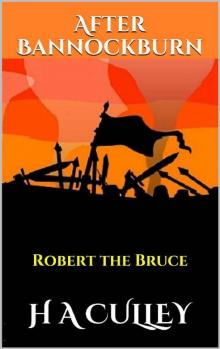 After Bannockburn
After Bannockburn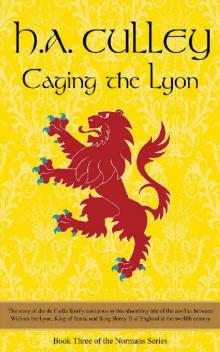 Caging the Lyon
Caging the Lyon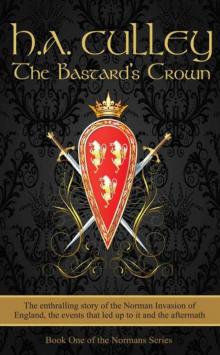 The Bastard's Crown
The Bastard's Crown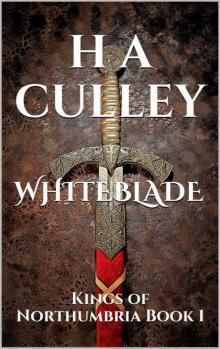 WHITEBLADE
WHITEBLADE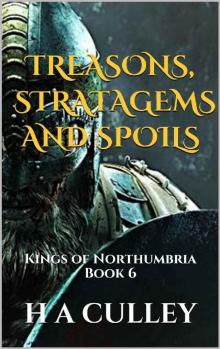 TREASONS, STRATAGEMS AND SPOILS: Kings of Northumbria Book 6
TREASONS, STRATAGEMS AND SPOILS: Kings of Northumbria Book 6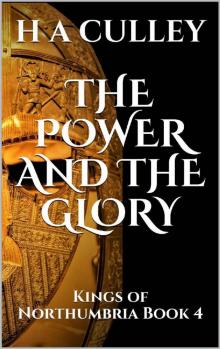 THE POWER AND THE GLORY: Kings of Northumbria Book 4
THE POWER AND THE GLORY: Kings of Northumbria Book 4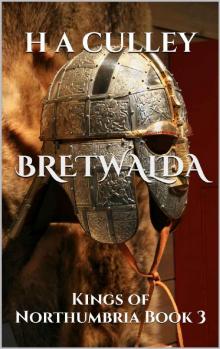 BRETWALDA: Kings of Northumbria Book 3
BRETWALDA: Kings of Northumbria Book 3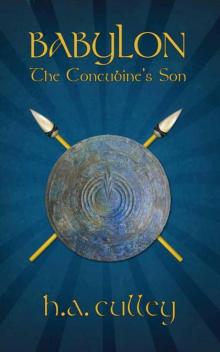 The Concubine's Son
The Concubine's Son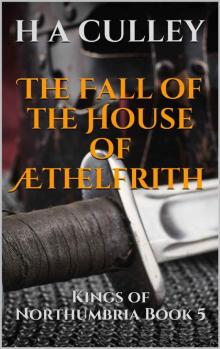 The Fall of the House of Æthelfrith: Kings of Northumbria Book 5
The Fall of the House of Æthelfrith: Kings of Northumbria Book 5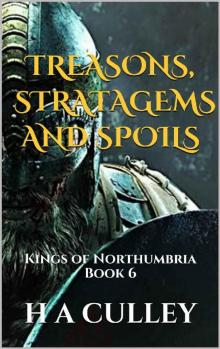 TREASONS, STRATAGEMS AND SPOILS
TREASONS, STRATAGEMS AND SPOILS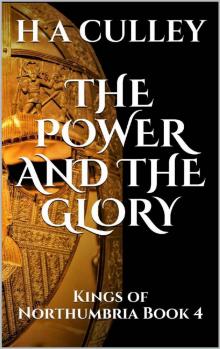 THE POWER AND THE GLORY
THE POWER AND THE GLORY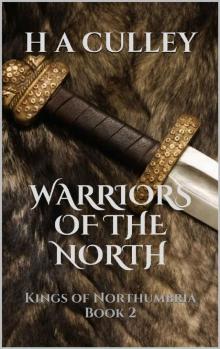 WARRIORS OF THE NORTH
WARRIORS OF THE NORTH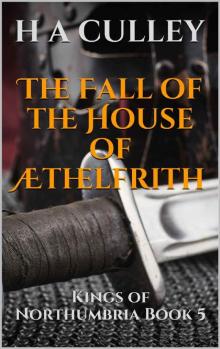 The Fall of the House of Æthelfrith
The Fall of the House of Æthelfrith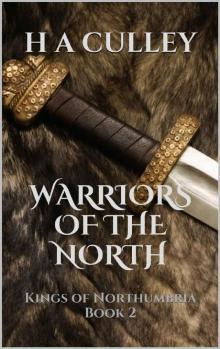 WARRIORS OF THE NORTH: Kings of Northumbria Book 2
WARRIORS OF THE NORTH: Kings of Northumbria Book 2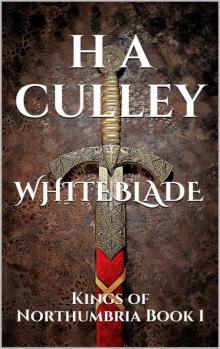 WHITEBLADE: Kings of Northumbria Book 1
WHITEBLADE: Kings of Northumbria Book 1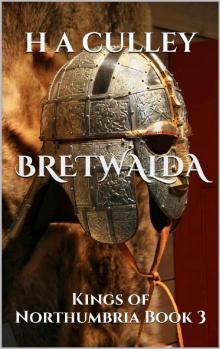 BRETWALDA
BRETWALDA